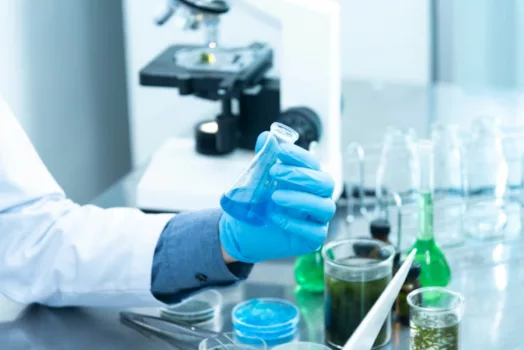The development of modern medicine has always relied on scientific breakthroughs, but today, the process is evolving at an unprecedented pace. Cutting-edge technologies are transforming how new medicines are discovered, tested, and produced, making treatments more effective and accessible.
From AI-driven medicine discovery to antibody discovery platforms, these innovations are addressing pressing global health challenges, including cancer, autoimmune diseases, and rare genetic disorders.
#1 AI-Driven Medicine Discovery
Back in January of 2023, AbSci became the first to use AI for creating de novo antibodies in silico. The following month, in February 2023, the FDA granted its first Orphan Drug Designation to an AI-designed medication.
According to research, AI can be one of the most powerful tools in medicine development, especially in terms of speeding up the process. Machine learning analyzes vast datasets to identify medicine candidates quickly, replacing the slow trial-and-error approach. AI figures out how different compounds interact with the human body, helping researchers zero in on the best options faster.
Pharma companies are using AI to create targeted treatments for diseases like cancer, Alzheimer’s, and rare genetic disorders. It’s also helping repurpose old medicines for new uses, cutting down on both time and costs to get life-saving treatments out there sooner.
#2 Antibody Discovery Platforms
Antibody-based medications have emerged as powerful tools in treating autoimmune diseases, cancer, and infectious diseases. Antibody discovery companies are utilizing sophisticated antibody discovery platforms to develop antibodies that precisely target disease-related proteins. This, in turn, is making treatments more effective while minimizing side effects.
According to Alloy Therapeutics, when starting an antibody discovery campaign, selecting the right binder recovery system is crucial to the workflow. Antibody discovery platforms integrate advanced computational techniques with experimental workflows. This allows researchers to streamline antibody medication discovery and maintain the overall workflow of the medicine discovery process.
Antibody optimization workflows further enhance the process by fine-tuning antibodies for better stability, efficacy, and safety. Unlike traditional medication development, which often involves a lengthy trial phase, these platforms enable researchers to rapidly generate and refine therapeutic antibodies.
#3 CRISPR Gene Editing
CRISPR has transformed genetic medicine by enabling precise DNA editing. Researchers can correct mutations causing inherited diseases like cystic fibrosis and sickle cell anemia.
Beyond genetic disorders, CRISPR is also being studied for cancer treatment, allowing scientists to engineer immune cells to target tumors more effectively. The technology is also showing promise in infectious disease research, with studies investigating how CRISPR can be used to disable viruses before they replicate.
With ongoing advancements, the medical field is moving closer to personalized gene therapies that could change the way we treat complex conditions.
#4 3D Bioprinting
The concept of 3D printing has evolved beyond manufacturing into the world of biomedicine. 3D bioprinting is now being used to create patient-specific tissues, implants, and even organ models for surgical practice.
In medicine development, bioprinted tissues allow researchers to test the effects of new medications in a controlled environment that closely mimics the human body. This approach significantly reduces reliance on animal testing and provides more accurate data on how a medicine will behave in human tissues.
For patients awaiting organ transplants, the potential of bioprinted organs is particularly exciting. While printing fully functional human organs is still in development, researchers have successfully bioprinted cartilage, skin, and even partial liver tissue.
As this technology advances, it could address the global shortage of donor organs and transform the way we approach regenerative medicine.
#5 Nanotechnology
Nanotechnology is enabling groundbreaking improvements in medicine delivery systems. Nano-targeted delivery systems combine therapeutic medicine with nanoparticles using rational targeting pathways. This innovation overcomes key drawbacks of conventional treatments, such as poor stability, solubility, transmembrane transport, short circulation time, and toxic effects.
In cancer treatment, for example, nanoparticles can be designed to specifically target tumor cells, reducing damage to healthy tissues. This precise medicine delivery system increases treatment efficiency and reduces the toxic effects commonly associated with chemotherapy.
Beyond oncology, nanotechnology is being used in vaccine development, where nanoparticle-based vaccines can generate a stronger immune response with fewer doses.
Frequently Asked Questions
Can nanotechnology be used as ingestible medication?
Yes, nanotechnology is used in ingestible medications to improve medicine delivery and efficacy. Nano-sized particles can target specific cells, enhance absorption, and reduce side effects by controlling medication release. This tech is especially useful for tackling cancer, infections, and chronic diseases, making treatments more precise and effective.
How can AI help with medication discovery?
AI accelerates medicine discovery by analyzing large datasets to identify potential medication candidates and predict their efficacy. Machine learning algorithms can model molecular interactions, optimize chemical structures, and streamline clinical trial designs. AI also helps in repurposing existing medicine for new treatments, reducing costs and time in bringing medications to market.
How can we speed up the vaccine development process?
Speeding up vaccine development involves leveraging technologies like mRNA platforms, rapid genomic sequencing, and AI-driven data analysis. Streamlining regulatory processes, increasing funding, and enhancing global collaboration also play critical roles. Large-scale manufacturing facilities and effective distribution networks ensure rapid deployment once a vaccine is approved.
These innovations are making medicine more effective and also ensuring that new treatments reach patients faster than ever before. As technology evolves, the future of medicine development looks increasingly promising, with groundbreaking discoveries on the horizon that will redefine how we treat diseases.
Follow me down the rabbit hole!
I'm Alice and I live with a dizzying assortment of invisible disabilities, including ADHD and fibromyalgia. I write to raise awareness and end the stigma surrounding mental and chronic illnesses of all kinds.








